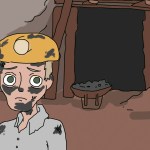Making Fun of “Rednecks” Isn’t Funny
Before Halloween in 2012, an organization at Ohio University called Students Teaching About Racism In Society, or STARS, created posters showing students of different cultures juxtaposed against costumes meant to mock said cultures, each with the caption “We’re a culture, not a costume. You wear the costume for one night. I wear the stigma for life.” This year, images of the posters went viral, drawing praise from a variety of sources, but inexplicably yet inevitably sparking complaints about how the posters are somehow “censorship.”
One poster depicts a man with light skin, blue eyes, and blond hair next to a picture of a costumed model in a plaid shirt with a taped-on goatee pretending to play a banjo. In response, one Tumblr user demanded, “I’m sorry but why the f*** is the redneck one on here?” “Lmaoooo white people be really tryna fit in like being oppressed is a trend,” added another.
This would make sense if it the poster was just talking about white people in general; racism against white people has never been an issue, and a costume meant to mock them would not invoke the same violent history that the other costumes would.
But that’s not what the poster was about. Instead, it referred to a specific culture: people from Appalachia, one of the poorest regions in the United States.
During the 1700s, Scottish and Irish immigrants settled in the southeastern part of the Appalachian mountain range, stretching from southern New York to northern Mississippi, Alabama, and Georgia. Many were indentured servants, who were required to work for seven years, for a master who often mistreated them, in exchange for passage to America. Historically, they have been stereotyped as backward and primitive. Today, this prejudice remains socially acceptable.
Liberals love to mock “hillbillies” and “rednecks” because they’re more likely to vote Republican. There are plenty of (completely false) jokes about rural Southerners being inbred, or having sex with close relatives, because incest is just so funny to joke about. They’re painted as having bad teeth and going barefoot, not to mention bigoted, unintelligent, and illiterate. Appalachians are mocked for their accents, finding it harder to get jobs because they are perceived as ignorant.
Appalachian storyteller and writer Gary Carden recalls what his grandmother told him, “Every time you open your mouth, you will be weighed and found wanting.”
The material effects of this prejudice are very real, and very harmful. In the book Whistlin’ and Crowin’ Women of Appalachia: Literary Practices since College, Appalachian writer and former professor Katherine Kelleher Sohn points out that teachers in Appalachian schools tend to mock students for their accents and poverty, discouraging them from seeking education.
Appalachia is a region rich in coal, but prejudice means that this hurts the people who live there rather than helping them. While native Appalachians work menial, dangerous, low-wage jobs mining coal, corporations based in other parts of the country reap the profits. The process of coal mining also harms the environment; sometimes, entire tops of mountains are blown off in order to access coal. Coal sludge, a waste product from washing coal, is stored in dams that have occasionally broken, letting loose toxic flooding that has killed people.
In other instances, coal companies have poisoned water in the mining process. One Kentucky resident named Judy discovered that a cancer-causing chemical was being dumped into a creek where her son played. She complained to the state; they did nothing. Soon afterwards, she died of brain cancer.
Silas House, a writer and friend of Judy’s, wrote an op-ed for the New York Times: “[I]nvisible is how we’ve been taught to think of ourselves since coal was first discovered here… We were also told the success of the mines mattered above all else, that if we complained about the dust, noise and disrespect pumped out by the mine in our community, people would lose jobs. The coal companies, the news media and even our own government have all been complicit in valuing Appalachian lives less than those of other Americans. Otherwise, it might be harder for them to get that coal out as quickly and inexpensively as they do.”
When people don’t care about an area because it’s “the middle of nowhere,” when it’s considered forward-thinking and progressive to dehumanize the people who live there, this exploitation is able to continue unhindered. It’s time to stop treating this issue like a joke.







You must be logged in to post a comment.